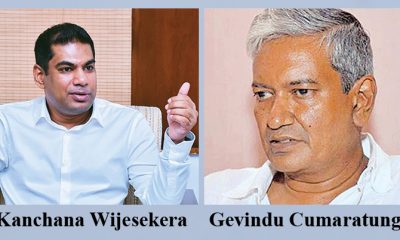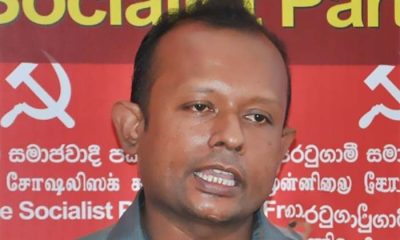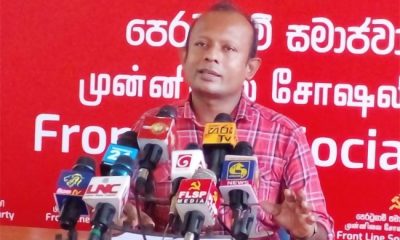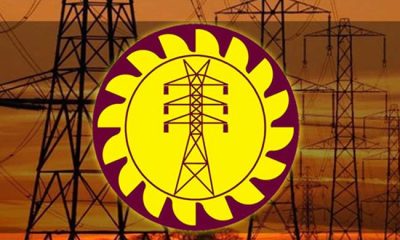News
Replacing a state monopoly with a private sector oligopoly
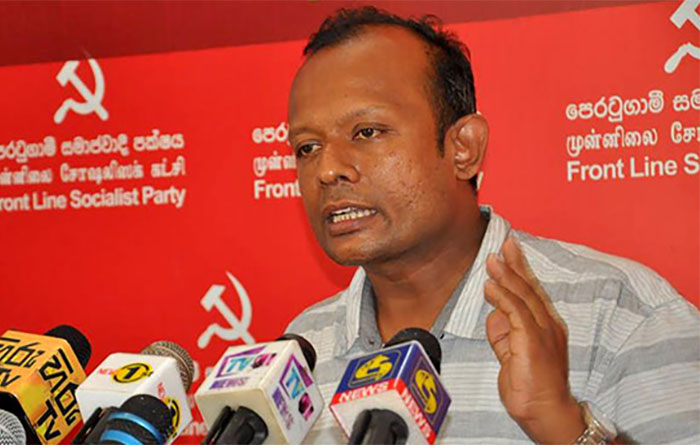
Proposed Sri Lanka Electricity Bill
By Rathindra Kuruwita
If the Sri Lanka Electricity Bill, currently under consideration in Parliament, is enacted, it could empower a handful of private companies, owning transmission lines, to exert undue control over the nation, potentially holding it hostage, the Education Secretary of the Frontline Socialist Party (FSP), Pubudu Jayagoda said.
The Bill, if passed, will replace Ceylon Electricity Board Act (No. 17 of 1969) and Sri Lanka Electricity Act (No. 20 of 2009).
One of the stated objectives of the Act is to attract new investment into the Electricity Industry, supported by segregation and separation of the activities of the Electricity Industry, currently vested in a single Government owned entity, by the incorporation of independent corporate entities in whom shall be vested all activities connected with the generation, transmission, distribution, trade, supply and procurement of electricity and who shall be responsible for the efficient management of these activities and for the creation of market competition, he said.
The other objectives are to facilitate private sector investment in every activity of the Electricity Industry using stock market listing and public private partnership modalities and transition and reorganisation of the Electricity Industry and the implementation of identified reforms based on timely and essential legal, structural, oversight and market-based changes.
Jayagoda remarked that essentially, the government has shifted its stance from viewing electricity as a public good, which it has a duty to furnish, to subjecting the sector to market forces. He noted that with the enactment of the Act, the government relinquishes its responsibility to provide electricity to households for improving their quality of life or to enterprises to stimulate economic endeavours.
“In the recent past, the electricity tariff increased dramatically. Electricity was disconnected in almost a million households and in 11,000 industries,” he said.
Jayagoda pointed out that the tariff adjustments were implemented with the aim of enabling the CEB to achieve a profit of approximately 62 billion rupees. However, according to some experts, the CEB actually recorded a profit of about 90 billion rupees.
“We cautioned that these adjustments were not solely aimed at covering CEB expenses, as claimed by the government, but rather to generate substantial profits. Now, it’s evident to everyone that our concerns were valid,” he remarked.
Jayagoda said according to laws that govern the electricity sector states that the baseload, apart from peak hours, must be generated using the least cost sources.
“Hydro power is the source that we can use to generate electricity at the lowest cost. One can generate a unit of electricity, using hydro-power, under five rupees at most. But the cost spikes to about 40-50 rupees when a unit is generated by coal. A unit of electricity, generated by diesel, costs about 90 rupees, and the CEB buys at around 120 rupees when they purchase from private power plants,” he said.
Thus, it is obvious that the raison d’etre of this Bill is to legalize increased electricity tariffs, he said. The existing laws that govern the sector frowns upon high-cost private thermal power plants, Jayagoda added.
Jayagoda stated that this Bill eliminates these barriers and grants the Cabinet of Ministers the authority to decide on the type of power plants to be constructed. Currently, it is the responsibility of the CEB to determine the selection of power plants.
“The government wants to allow private companies to produce, distribute, and transmit electricity. Giving transmission lines to the private companies poses serious problems. Already, India’s Adani is building a 400 kv transmission line from Kilinochchi to Habarana. Adani got this without a tender. When we ask the Ministry of Power and Energy, they claim this is a government to government project and this there was no need to call for tenders. However, it is a private Indian company that is building the transmission line and thus tenders should have been called,” he said.
Jayagoda questioned the potential scenario where the government seeks to transmit electricity generated by another company through this line. He inquired about the financial implications for the other company, asking how much they would need to pay Adani for the usage of the transmission line.
“What will be the fee for access? And what if Adani refuses to permit electricity generated by other companies to pass through their transmission lines?” Jayagoda questioned. “While the government claims the Bill aims to enhance competition in the sector, in reality, it could result in the formation of an oligopoly controlled by a handful of companies that own transmission infrastructure.”
Jayagoda highlighted that the new Bill has diminished the authority of the Public Utilities Commission (PUC). In Sri Lanka, long-term generation plans are periodically devised, and tariff revisions are conducted. Currently, the PUC is responsible for overseeing the implementation of these long-term plans and determining the extent of tariff revisions.
“The new Bill effectively strips the PUC of its authority in these areas. Additionally, it grants the line minister the discretion to determine tariffs and oversee the implementation of long-term generation plans. Furthermore, the Bill restricts the PUC’s regulatory scope to large-scale power plants, excluding its jurisdiction over small power plants (11 and 33 kV plants). Ensuring that these power plants adhere to specific quality standards is crucial for safeguarding life and property. What are the potential consequences when private entities establish small power plants and generate electricity without any regulatory oversight?” Jayagoda questioned.
Jayagoda pointed out that the new Bill introduces a provision allowing Sri Lanka’s national grid to be connected to the grid of a foreign power, a clause absent in previous legislation. He emphasized that due to its geographical location, Sri Lanka can only feasibly be linked to the Indian national grid.
“Even more concerning is the provision in the Bill stating that it’s the Cabinet of Ministers who will determine the terms of any agreement if our grid is linked to another country’s national grid. This decision-making process has been heavily politicised,” Jayagoda said.
“What if India imposes similar conditions on us as they did on Nepal and Bhutan? In agreements with those countries, India mandated that they purchase a specified volume of electricity from India. As a result, Nepal is now compelled to buy Indian electricity at a higher cost, despite having the capacity to generate inexpensive hydro power. This fate could very well be awaiting us.”
News
NPP wins most LG bodies but sees drop in vote share: Hung councils raise concern

SJB trying to take control of CMC
Govt. suffers set back in N&E
SLPP records significant increase in votes but fails to win single body
The ruling National People’s Power (NPP) secured 266 out of 339 local government bodies at the May 6 election but suffered a setback in the northern and eastern regions as the Illankai Thamil Arasu Kadchi (ITAK) and the Sri Lanka Muslim Congress (SLMC) won 42 local authorities.
The ITAK and SLMC secured 37 and 05 local government bodies, respectively, although President Anura Kumara Dissanayake personally led the NPP’s campaign in the former war zone. The National Congress won the Akkaraipattu MC. In the last parliamentary election held in Nov. 2014, the NPP won all electoral districts, except Batticaloa.
The NPP obtained 4,503,930 votes countrywide whereas in the last parliamentary election it received 6,863,186 votes; there has been a drop of 2,359,256 votes.
The Samagi Jana Balawegaya (SJB) won 13 local government bodies, but the United National Party (UNP) and the Sri Lanka Podujana Peramuna (SLPP) failed to secure any.
The SLPP obtained 954,517 votes and 742 seats, accounting for 9.17% of the national vote. In a post on X, SLPP’s National Organiser Namal Rajapaksa said: “Over the past six months, the SLPP has regrouped and gained momentum by staying true to our principles. While some rely on false promises, we remain committed to honest, principled politics that put the people first. Thank you to everyone who stood by us. This is just the beginning. We will keep working, village by village, to rebuild and restore trust in real leadership.” The SLPP polled only 350,429 votes in last year’s general election.
In the 2018 LG polls, the SLPP won 231 councils. That was the first time the government of the day failed to win mini polls. Yahapalana partners, UNP and SLFP, having contested separately, suffered a debilitating setback.
In spite of the massive campaign carried out by the NPP, targeting the Colombo Municipal Council (CMC), the ruling party failed to secure an overall majority there. The NPP polled 81,000 votes to obtain 48 seats whereas the SJB and UNP polled 58,375 (29 seats) and 26,297 (13 seats) votes, respectively. The SLPP (05), SLMC (04), United Republican Front (01), United Peace Alliance (02), Sarvajana Balaya (02), and National People’s Party, National Freedom Front, People’s
Alliance and Democratic National Alliance one each.
In addition to political parties, five Independent Groups shared the remaining 09 seats of the CMC.
With no party holding a clear majority, the next Colombo Mayor will need to be elected through a Council vote.
SJB General Secretary Ranjith Madduma Bandara told a hastily arranged media conference that the SJB intended to elect an SJBer as Colombo Mayor with the help of the other Opposition parties. The former Minister said that the SJB would cooperate with the other parties in the Opposition regarding the appointment of Mayors and Chairmen of the hung local councils.
Meanwhile, the Leader of the House, Bimal Ratnayake, has said those who won local government bodies in the Northern Province but without absolute majorities have sought NPP support to form administrations.
Addressing a separate media briefing, JVP General Secretary, Tilvin Silva, declared that the ruling party wouldn’t, under any circumstances, form coalitions with those who had been rejected by the people.
News
Local councils won by political parties and Ind. groups

Colombo District
NPP:
Colombo MC, Dehiwala-Mount Lavinia MC, Sri Jayewardenepura MC, Moratuwa MC, Kaduwela MC, Kolonnawa UC, Seethawakapura UC, Maharagama UC, Kesbewa UC, Boralesgamuwa UC, Kotikawatte PS, Seethawaka PS and Homagama PS.
Gampaha District
NPP:
Negombo MC. Gampaha MC, Wattala-Mabola UC (both NPP and SJB obtained six seats each), Katunayaka-Seeduwa UC, Minuwangoda UC, Ja-ela UC, Peliyagoda UC, Wattala PS, Katana PS, Divulapitiya PS, Mirigama PS, Minuwangoda PS, Attanagalle PS, Gampaha PS, Mahara PS, Dompe PS, Biyagama PS and Kelaniya PS.
Kalutara District
NPP:
Panadura UC, Horana UC, Kalutara MC, Panadura PS, Bandaragama PS, Horana PS, Madurawala PS, Bulathsinhala PS, Matugama PS, Dodangoda PS, Kalutara PS, Beruwala PS, Agalawatta PS (both NPP and SJB obtained six seats each), Millaniya PS and Walallawita PS
Kandy District
NPP:
Kandy MC, Wattegama UC, Kadugannawa UC, Nawalapitiya UC, Thumpane PS, Harispattuwa PS, Poojapitiya PS, Pathadumbara PS, Udadumbara PS (both NPP and SJB obtained six seats each), Minipe PS, Medadumbara PS, Kundasale PS, Pathahewaheta PS, Kandy Four Gravets and Gangawatta Korale PS, Yatinuwara PS, Udunuwara PS, Udapalatha PS, Ganga Ihala Korale PS and Pasbage Korale PS.
Matale District
NPP:
Dambulla MC, Matale MC, Pallepola PS, Galewela PS, Dambulla PS, Naula PS, Laggala-Pallegama PS (both NPP and SJB obtained six seats each), Wilgamuwa PS, Matale PS, Yatawatta PS, Ukuwela PS, Rattota PS.
Nuwara Eliya District
NPP
Nuwara Eliya MC, Hatton-Dikoya UC, Thalawakale-Lindula UC, Maskeliya PS, Norwood PS (NPP and Ceylon Workers’ Congress ‘P’ wing won six seats each), Ambagamuwa PS, Agarapathana PS (NPP and Ceylon Workers’ Congress ‘P’ wing won four seats each), Kotagala PS ((NPP and Ceylon Workers’ Congress ‘P’ wing won five seats each), Nuwara Eliya PS, Kothmale PS, Hanguranketha PS and Walapone PS.
Galle District
NPP:
Galle MC, Ambalangoda UC, Hikkaduwa UC, Balapitiya PS, Ambalangoda PS, Welivitiya Divithura PS, Karandeniya PS, Bentota PS, Neluwa PS, Thawalama PS, Nagoda PS, Niyagama PS, Baddegama PS, Yakkalamulla PS, Rajagama PS, Akmeemana PS, Bope Poddala PS, Imaduwa PS and Habaraduwa PS.
Matara District
NPP:
Matara MC, Weligama UC, Pitabeddara PS, Kotapola PS, Kirinda Puhulwella PS, Mulatiyana PS, Pasgoda PS, Athureliya PS, Akuressa PS, Malimbada PS, Hakmana PS, Kamburupitiya PS, Thihagoda PS, Devinuwara PS, Dikwella PS, Matara PS and Weligama PS.
Hambantota District
NPP:
Hambantota MC, Tangalle UC, Weeraketiya PS, Katuwana PS, Beliatta PS, Tangalle PS, Angunakolapelessa PS, Ambalantota PS, Tissamaharama PS, Sooriyawewa PS, Hambantota PS and Lunugamwehera PS.
Jaffna District
ITAK:
Jaffna MC, Chavakachcheri UC (ITAK and ACTC won six seats each), Delft PS, Velanai PS, Walikamam west PS, Walikamam north PS, Walikamam south-west PS, Walikamam south PS, Walikamam east PS, Vadamaratchchy South West PS, PPD PS, Chavakachcheri PS and Nallur PS.
ACTC
VVT UC, PPD UC, Karainagar PS ( ACTC, UNP, NPP , TMK and Ind group ii won two seats each), Kayts PS (EPDP),
Kilinochchi District
ITAK:
Pachchilaippalli PS, Karachchi PS and Poonakary PS
Mannar District
ITAK:
Mannar UC, Mannar PS, Manthai West
NPP:
Nanattan PS
SJB:
Musali PS
Vavuniya District
Vavuniya MC (DTNA, NPP and Sri Lanka Labour Party won four seats each)
NPP:
Vavuniya north PS, Vavuniya south (Tamil) PS and Vavuniya South (Sinhala) PS
SJB:
Vengalasettikulam PS
Mullaitivu District
ITAK:
Manthai East PS, Thunukai PS
ITAK:
Puthukudirippu PS and Maritimepattu PS
SJB:
Kalutara District
Palindanuwara PS
Kandy district
SJB:
Gampola UC
Akurana PS
Panwila PS
Matale
Ambanganga Korale PS
Kalutara District
Ind. Group 1 Beruwela UC
Batticaloa district
ITAK:
Batticaloa MC, Eravurpattu PS, Koralaipattu PS, Manmunai South and Eluvil Pattu, Manmunai Pattu PS, Manmunai West and Porathivu Pattu PS.
SLMC:
Eravur UC, Kathankudi UC,
TMVP:
Koralai Pattu North, Manmunai South West PS (ITAK and TMVP won six seats each)
Ampara district
National Congress:
Akkaraipattu MC, Akkaraipattu PS
NPP:
Ampara UC, Dehiattakandiya PS, Damana PS, Uhana PS, Mahaoya PS, Namaloya PS, Padiyatalawa PS, Lahugala PS,
ITAK:
Navithanveli PS, Alayadiwembu (ITAK and NPP won seven seats each), Karaitheevu PS
ACMC:
Sammanthurai PS, Ninthavur PS
SLMC:
Irakkamam PS, Addalachenai PS,
Independent Group 4
Pottuvil PS
Independent Group 1
Thirukkovil PS
Trincomalee District
ITAK:
Trincomalee MC, Verugal PS, Trincomalee town and Gravets PS, Muttur PS,
ACMC:
Kinniya UC (SJB and ACMC won four seats each) and Kinniya PS
NPP:
Seruwila PS, Kantale PS, Morawewa PS, Gomarankadawela PS, Padavisripura PS, Thambalagamuwa PS (NPP and SJB won three seats each)
SLMC:
Kuchchuveli PS,
Kurunegala District
NPP:
Kurunegala MC, Kuliyapitiya UC, Giribawa PS, Galgamuwa PS, Polpithigama PS, Nikaweratiya PS, Kobeigane PS, Mahawewa PS, Ibbagamuwa PS, Wariyapola PS,Panduwasnuwara PS, Bingiriya PS, Udubaddawa PS, Pannala PS, Kuliyapitiya PS, Alawwa PS, Narammala PS, Polgahawela PS, Kurunegala PS, Mawathagama PS and Rideegama PS.
Puttalam District
NPP:
Puttalam MC, Chilaw UC, Kalpitiya PS (NPP and SJB won 10 seats each), Puttalam PS, Wanathawilluwa PS, Karuwalagaswewa PS,Nawagaththegama PS, Anamaduwa PS, Arachchikattuwa PS, Chilaw PS, Nattandiya PS and Wennappuwa PS.
Anuradhapura District
NPP:
Anuradhapura MC, Medawachchiya PS, Rambawewa PS, Kebitigollewa PS, Padaviya, Kahatagasdigiliya PS, Horowpothana PS, Galenbindunuwewa PS, Thalawa PS, Nuwaragampalatha Central PS, Nuwaragampalatha east PS, Nochchiyagama PS, Rajanganaya PS, Galnewa PS, Ipologama PA, Mihintale PS, Thirappane PS, Kekirawa PS and Palagala PS.
Polonnaruwa District
NPP:
Polonnaruwa MC. Elahera PS, Hingurakgoda PS, Medirigiriya PS, Lankapura PS, Welikanda PS, Dimbulagala PS and Polonnaruwa PS.
Badulla District
NPP:
Badulla MC, Bandarawela MC, Mahiyanganaya PS, Ridimaliyadde PS, Soranthota PS,Meegahakivula PS, Kankaketiya PS, Passara PS, Lunugala PS, Badulla PS, Hali ela PS, Uva Paranagama PS, Welimada PS, Bandarawela PS, Ellpa PS,Haputale PS and Haldamulla PS.
Independent Group:
Haputale UC
Moneragala District
NPP:
Bibile PS, Medagama PS, Madulla PS, Siyambalanduwa PS, Monaragala PS, Badalkumbura PS, Buttala PS, Kataragama PS, Wellawaya PS and Thanamalwila PS
NPP also won all LG authorities in Ratnapura and Kegalle districts.
News
15 more Sri Lankan youth rescued from cybercrime camps in Myanmar

Fifteen Lankans, forcibly held in cybercrime camps in Myanmar, had been rescued on Tuesday (06), government sources said.
This operation was carried out through coordination between the Sri Lankan Ministries of Foreign Affairs, Foreign Employment, and Tourism, along with the Sri Lankan Embassy in Thailand and the Thai government.
The rescued Sri Lankan youth were handed over to the Sri Lankan Ambassador in Thailand, Wijayanthi Edirisinghe, by Thai authorities on Tuesday morning in Mae Sot, located in the Myawaddy region, along the Myanmar-Thailand border. Officials from the Thai Embassy also attended the handover.
This rescue was the result of diplomatic efforts and telephone discussions held by Sri Lanka’s Minister of Foreign Affairs, Foreign Employment and Tourism, Vijitha Herath, with Thailand’s Minister of Foreign Affairs, Maris Sangiampongsa, and Myanmar’s Minister of Foreign Affairs, U Than Swe.
The rescue operation was supported diplomatically by the Thai Embassy, the International Organisation for Migration (which provided transportation), non-governmental organisations offering welfare assistance, and officials of the Thai and Myanmar governments.
Minister Vijitha Herath expressed appreciation for their roles.
Previously, 14 Sri Lankans were rescued from cybercrime camps in Myanmar on March 18, and 27 others were brought back to Sri Lanka on Dec. 17, 2024.
By Shyam Nuwan Ganewatte
-

 News6 days ago
News6 days agoRanil’s Chief Security Officer transferred to KKS
-

 Opinion4 days ago
Opinion4 days agoRemembering Dr. Samuel Mathew: A Heart that Healed Countless Lives
-

 Business2 days ago
Business2 days agoAitken Spence Travels continues its leadership as the only Travelife-Certified DMC in Sri Lanka
-

 Business2 days ago
Business2 days agoLinearSix and InsureMO® expand partnership
-

 Latest News1 day ago
Latest News1 day agoNPP win Maharagama Urban Council
-

 Business6 days ago
Business6 days agoCCPI in April 2025 signals a further easing of deflationary conditions
-

 Features6 days ago
Features6 days agoExpensive to die; worship fervour eclipses piety
-

 Features4 days ago
Features4 days agoTrump’s economic missiles are boomeranging





